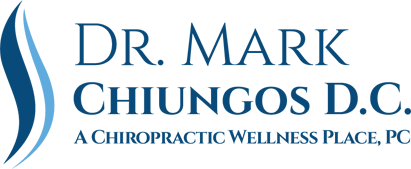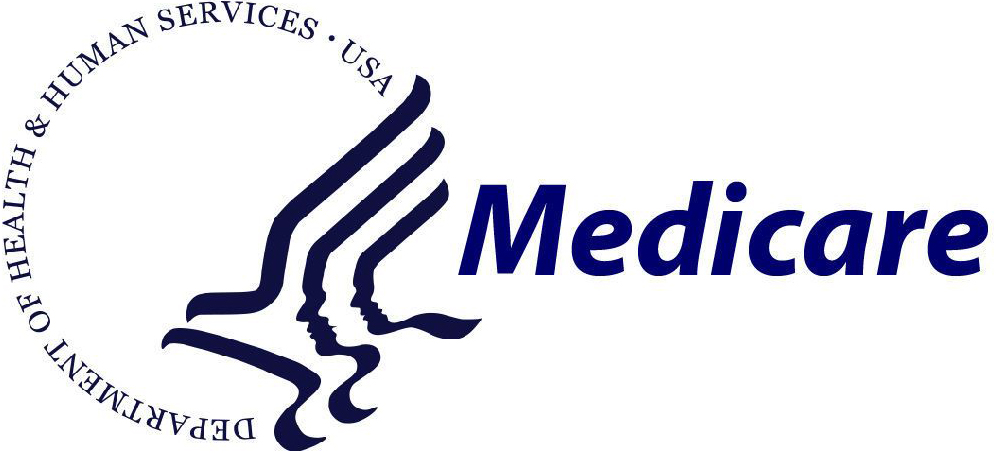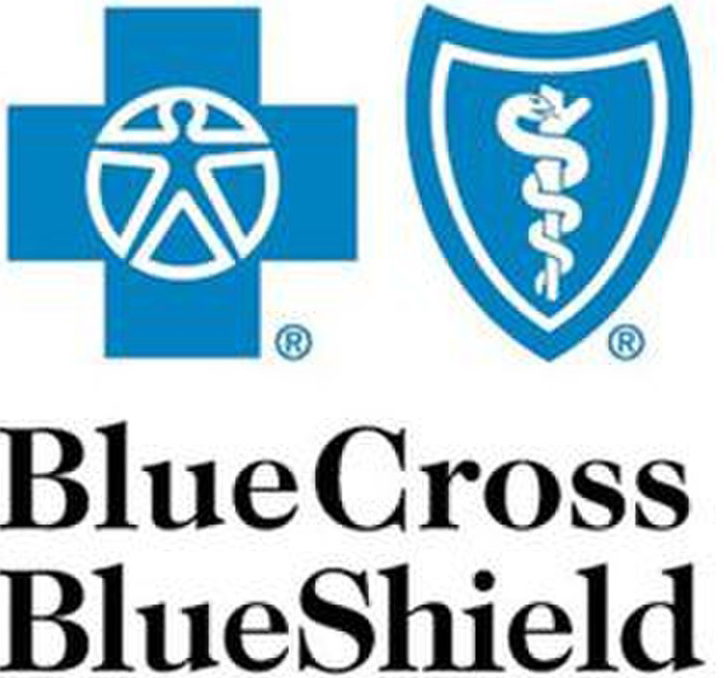What to Prepare for Your First Appointment
There are several things you can bring with you:
- X-rays, MRI reports and/or discs/CD-ROMs
- any supports you currently use, like support belts or orthotics
- list of current medications
- insurance card
At your first appointment, we’ll walk through the following three steps
FIRST, a discussion of your unique situation
Your issue could be an injury — known or unknown. Or your pain could stem from everyday life, from your athletic pursuits to your commute and desk set-up. Dr. Chiungos will take a relevant, thoughtful history.
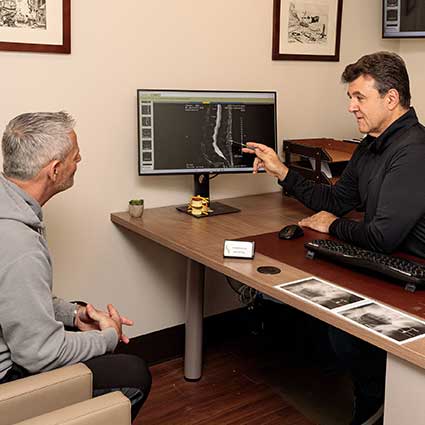
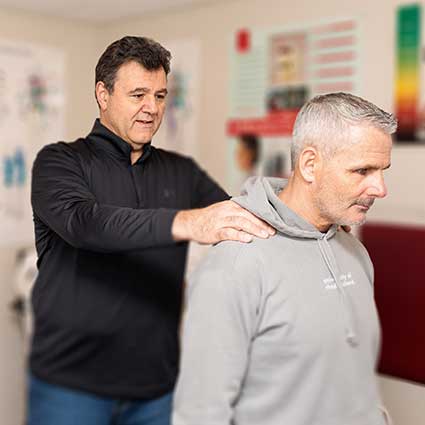
SECOND, a careful examination to identify the problem — or problems
Multiple assessments will pinpoint your areas of spinal misalignment, compression, or both. You’ll want to wear comfortable clothes that can be easily manipulated around any injuries. If Dr. Chiungos has concerns, he will refer you to a nearby hospital for X-ray or MRI, as appropriate, to confirm the results of the physical exam.
FINALLY, developing of a personalized Care Plan to relieve your symptoms and restore your function
Dr. Chiungos will discuss with you the appropriate treatment, or combination of treatments, for your situation. (Read more about our treatments at the blog.) If you agree with the care plan, you may begin immediately. You can expect the first visit to take about an hour. You will leave on the road to healing, with a plan for your ongoing care.
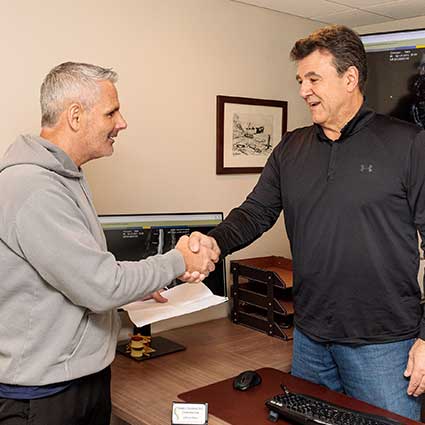
Insurances Billed:
BlueCross BlueShield of MA
Harvard Pilgrim Health Care
Tufts Health Plan
UniCare/GIC
Medicare
Forms of Payment Accepted:
Cash
Check
Credit/Debit Card
HSA Card
FSA Card
CareCredit is the healthcare credit card designed exclusively for healthcare services with special financing options.* With CareCredit, you can use your card for all of your follow-up care as well as annual checkups.
Learn more by visiting https://www.carecredit.com/ or contacting our office.
Ready to apply? Apply Online for your CareCredit card today.
*Subject to credit approval. Minimum monthly payments required. Ask us for details
FAQ
Chiropractic
Most insurance policies offer some chiropractic coverage. Dr. Chiungos works with Blue Cross-Blue Shield, Harvard Pilgrim Healthcare, Tufts Health Plan, Unicare/GIC, and Medicare. See the No Surprises Act for more information.
Absolutely. Chiropractic as a profession is more than 100 years old. We follow industry guidelines during our new patient induction process to minimize risk and maximize benefit. Chiropractic malpractice insurance is considered by many to be the least costly professional insurance in the healthcare industry because chiropractic is generally considered a safe, manual therapy.
It depends on your mechanism of injury and your current state of health. You might start feeling better as soon as your adjustment is finished. You might need to go home and ice (Dr. Chiungos will advise you). If your injury is serious, it may take several visits. But your healing has begun from the first adjustment. Your personal care plan is designed to take you from where you are today to your best possible outcome. Dr. Chiungos will keep you updated on your progress at each visit.
SpineMED®
Decompression treatment is not currently covered by health insurance. If Dr. Chiungos believes this is an integral part of your treatment plan, he will discuss all costs and potential discounts before the start of care. You will receive informed consent.
Spinal Disc Decompression with the SpineMED® Table has shown to be safe and generally without major side effects or complications once abnormal conditions have been ruled out. The process is so safe and comfortable, it’s not uncommon for patients to fall asleep!
- Patients under 12 years old
- If you had spinal surgery that involved clips, mesh or fusion
- If you have fractures, tumors or infections
- If you have osteoporosis or spondylolisthesis where there’s been a fracture or non-union defect in the spine, where that segment that we want to traction is unstable
Damaged intervertebral discs seldom heal as the discs are constantly under pressure from muscular spasm—during normal activities, and even while sleeping! SpineMED is designed to reduce the pressure in the discs, promoting the influx of vital fluids, nutrients and oxygen back into the discs to assist the body’s natural rebuilding process. This process may speed up the natural repair and could eventually heal damaged spinal discs.
Sessions are typically 30 minutes long. It could take 15 to 25 sessions or more to see some relief from your discomfort. That’s variable based on your status and the condition we’re treating. Ideally, the sessions are performed daily with rest on the weekend.
Aspen Laser
Laser treatment, as used in chiropractic offices, is not currently covered by health insurance. If Dr. Chiungos believes this is an integral part of your treatment plan, he will discuss all costs and potential discounts before the start of care.
Laser therapy has been in use for over thirty years with almost no side effects reported. Aspen Laser is FDA-registered and passes all safety compliance requirements. The treatments are not painful; in fact, laser is warm and comfortable to your skin. Dr. Chiungos will check in with you regularly to make sure the temperature feels right, and you can always speak up if it starts to feel too warm. The main safety concern is for the eyes, which is why Dr. Chiungos will provide protective glasses for both patient and doctor at each session.
Laser is effective on most parts of the body; however, there are times when laser is not appropriate:
- during pregnancy
- within twelve months of cancer treatments
- during the use of photo-sensitizing medications
- over recent steroid injections (seven days)
- over growth plates or reproductive glands
- over tattoos or skin infections
Laser therapy promotes energy production supporting cellular repair, increased blood flow, increased red blood cell oxygen-carrying capacity, and decrease of inflammation. When used in conjunction with traditional chiropractic, laser can reduce pain and healing time, and promote a deeper, more complete healing to the area of concern.
Sessions typically last 15 to 20 minutes, depending on the size of the treatment area. They generally start longer and reduce in length as you heal. Most acute conditions require only 10 – 12 treatment sessions. If you have a chronic condition, you may need 12 – 20 treatments and one or two follow-up sessions every month. The amount and frequency of treatments are determined through assessment of your condition combined with Dr. Chiungos’s experience treating patients with laser. You will likely start to feel better after your first 5 sessions.
